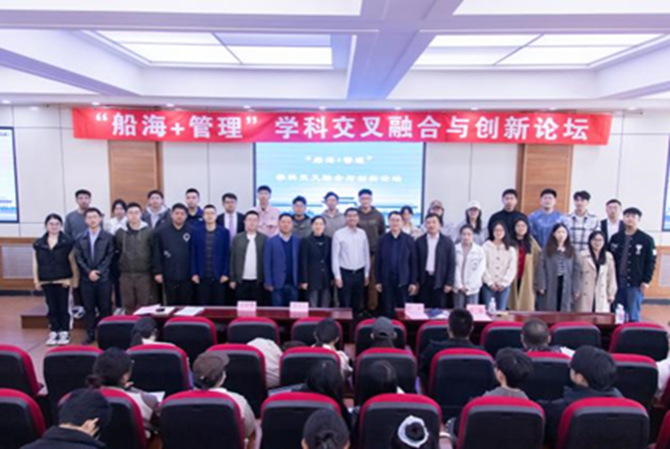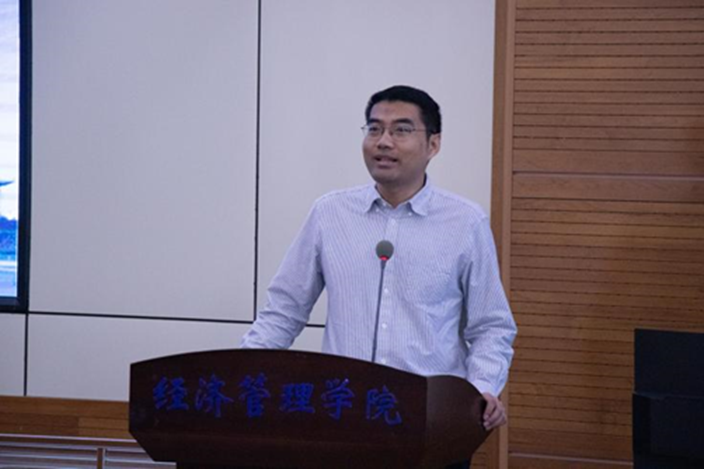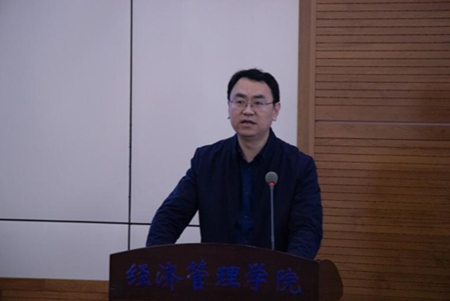On October 9th, 2024, the School of Economics and Management and the College of Shipbuilding Engineering jointly organized the "Ship and Sea + Management" Interdisciplinary Integration and Innovation Graduate Forum. The event took place in Conference Room 202, Building 31, and was attended by key figures including NI Baoyu, Dean of the College of Shipbuilding Engineering, and CHEN Heng, Dean of the College of Economics and Management, both of whom delivered opening speeches. Other notable attendees included HOU Lei, Deputy Director of the Graduate Work Department of the HEU Party Committee and Vice Dean of the Graduate School, and WANG Shiping, Vice Dean of the College of Shipbuilding Engineering. The opening ceremony was hosted by HU Yuzhen, Deputy Secretary of the Party Committee and Vice Dean of the College of Shipbuilding Engineering.

In his opening address, NI Baoyu emphasized the significance of interdisciplinary collaboration, as outlined in the report of the 20th National Congress of the Communist Party of China. He highlighted the importance of strengthening the construction of basic and emerging disciplines and accelerating the development of top universities with Chinese characteristics. NI explained that interdisciplinary collaboration is crucial for scientific advancement and essential for nurturing innovative talent in shipbuilding and maritime industries. He expressed hope that the forum would drive the deep integration of maritime and management disciplines, turning knowledge of "ship and sea" into "management" and vice versa. He envisioned this as a pathway to new growth opportunities for both fields.

CHEN Heng further discussed the importance of interdisciplinary work, citing President XI Jinping's repeated emphasis on the need for such collaboration. He referenced a National Science and Technology Innovation Conference where leading universities like Peking University and Tsinghua University advocated for breaking down disciplinary barriers to accelerate talent cultivation. HEU, CHEN noted, follows an educational path focused on shipbuilding, marine equipment, ocean exploration, and nuclear application, aligning with national strategies and addressing the country’s urgent needs. He stressed that the development of shipbuilding and maritime science is closely linked to management in areas such as strategic planning, industrial restructuring, and economic benefits. Conversely, management disciplines must align with the maritime field to develop their own distinctive characteristics. He also shared the School's ongoing efforts in areas like technology and economic analysis for shipbuilding, offshore energy development, underwater robotics, and collaborative underwater systems, all aimed at supporting China’s maritime power.

Following the opening ceremony, four experts from both colleges delivered keynote speeches. WANG Shiping, Vice Dean of the College of Shipbuilding Engineering, chaired the session and presented certificates to the speakers.
GONG Chengju presented on "Safety Assessment, Early Warning, and Improvement Countermeasures for China's Shipbuilding Industry Chain," discussing the current challenges facing the shipbuilding industry, including industry chain resilience and safety, and proposed solutions for addressing key vulnerabilities.
LI Yuke gave a talk on "The Influence of Polymer Solutions on Shear Flow Characteristics." His research focused on the dynamic characteristics of boundary layer flow when injecting viscoelastic fluids, with potential applications in underwater vehicle surface vortex control.
GUO Xinghai presented on "Marine Operation Methods for Shipborne Drones," outlining the various application scenarios for drones deployed on ships, including inspections, joint rescues, and collaborative operations.
WU Qigang delivered a report on "Ice Breaking Mechanisms Under High-Pressure Gas Bubble Impact Loads." His research proposes a novel high-pressure gas-assisted method for ice breaking, which is more efficient, clean, and directional, particularly relevant for Arctic development.
After these keynote presentations, eight graduate students from both colleges presented their academic research at two sub-venues. The students engaged in insightful academic exchanges and discussions with the audience.
The successful hosting of the forum highlighted the depth and potential of research in the shipbuilding and management fields and demonstrated the innovative outcomes that can emerge from interdisciplinary studies. Moving forward, the School of Economics and Management aims to expand its long-term academic and research collaborations with the College of Shipbuilding Engineering and other departments. This initiative will focus on developing interdisciplinary technology alliances with enterprises, institutions, and community organizations, promoting synergies between academic disciplines, industrial sectors, innovation pathways, and talent development.